Once again debate rages over the use of VAR. Tuesday's Champions League quarter-final fixtures saw the technology put to use in London and Merseyside with two different outcomes for the alleged offenders. Tottenham Hotspur's Danny Rose was penalised while Liverpool's Trent Alexander-Arnold wasn't. Two incidents it should definitely have been used for involved Fernandinho and Mohamed Salah, but we will come to that later.
Let's examine the VAR incident at the Tottenham Hotspur Stadium first. Rose sprinted into the area to launch himself at a goal-bound Raheem Sterling shot early in the first half of Tottenham's 1-0 first-leg win over Manchester City when Bjorn Kuipers was alerted by the eye in the sky that he may want to take a closer look.
Kuipers reviewed the footage from every available angle, which clearly shows the ball hitting Rose's arm. Kuipers pointed to the spot and brandished a yellow card to Rose for a deliberate hand ball, meaning the referee viewed Rose's action as intentional.

Uefa instructed its referees at the start of the season to punish players who use their arms in a way that makes their own bodies bigger. According to the letter of the law, Kuipers was correct. The laws make no allowances for player proximity or how fast the ball is travelling, but Rose is entitled to ask what he can do about a flailing arm as he flies through the air feet first to block a shot travelling at high speed from a few yards away.
Hugo Lloris saved the resulting spot kick from Sergio Aguero, much to Rose's relief.
At Anfield, Alexander-Arnold was given a reprieve when referee Antonio Mateu reviewed an incident after Liverpool goalkeeper Alisson punched a ball away that hit his defender on the arm. Like Rose and Sterling, both players were close together, meaning the ball travelled a short distance before striking Alexander-Arnold's arm.
If Rose is punished for the perception that he is using his arm to block the ball then Porto could make the same case against Alexander-Arnold. Also, the Liverpool defender's arm is further away from his body than Rose's when the ball hits. Although it may have been a harsh decision to award a penalty, in this case at least, the referee has not applied the rules correctly.
While the Porto camp may have felt aggrieved at that decision, the fact VAR was not used to alert the man in the middle to a shin-high challenge by Salah on defender Danilo later in the game left the Porto camp incandescent at Mateu, with captain Iker Casillas making his feelings known after the game on Twitter.
Salah caught the Porto defender with a studs-up challenge that looks worse every time you watch it. But with no action taken, the Egyptian is free to play in next week's return leg in Portugal where Liverpool will defend a 2-0 lead.
Fernandinho was just as fortunate to escape any fallout against Spurs. The Manchester City midfielder clattered into Harry Kane from behind, gave him a taste of elbow pie as he lay on top of the Spurs striker and then pushed his head down as he moved away. The Brazilian didn't receive even as much as a stern word.
VAR will never be a panacea for all of football's on-field ills. Instead of quelling the debate on whether it is right - or even necessary - to ask one man to judge a player’s intentions, all VAR has done is framed it differently, literally from every available angle and in High Definition.
If one referee views Rose as deliberately blocking Sterling's shot with his arm (and what other conclusion is there to draw from the yellow card?) but another sees Alexander-Arnold's incident as accidental, who are we to make them wrong?
At the same time, just because one TV match official deems neither Salah or Fernandinho incidents worth revisiting, doesn't mean others won't.
If VAR was supposed to right the wrongs of football and make talking points over bad refereeing decisions moot, it's failed miserably.
But then, if it did, what else would we talk about after the final whistle?


